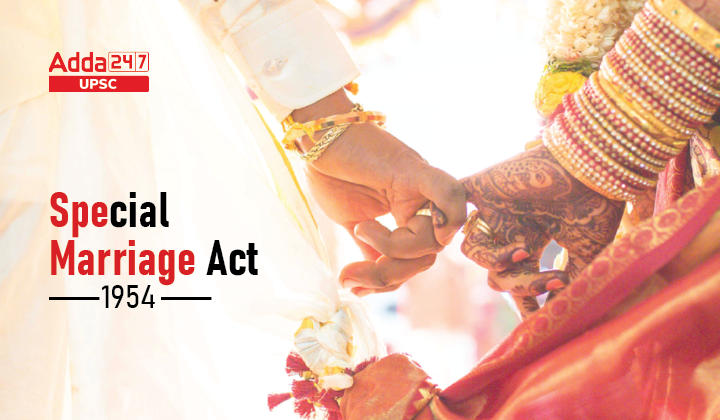Table of Contents
Special Marriage Act, 1954- Relevance for UPSC Exam
General Studies I- Social empowerment, communalism, regionalism & secularism.
In News
The Supreme Court has dismissed a writ petition challenging the Constitutional validity of certain provisions of the Special Marriage Act, 1954 under which couples seek refuge for inter-faith and inter-caste marriages.
Special Marriage Act, 1954
- The Special Marriage Act, 1954 (SMA) was enacted to facilitate the marriage of couples professing different faiths, and preferring a civil wedding.
- However, some practical problems arise in registering such marriages.
- The law’s features on prior public notice being given and objections for the safety and privacy of those intending to marry across religions.
- To overcome this, many settle for marriage under the personal law of one of them, with the other opting for religious conversion.
Petition in Supreme Court
- The Supreme Court dismissed a writ petition challenging the Constitutional validity of certain provisions of the SMA under which couples seek refuge for inter-faith and inter-caste marriages.
- The writ petition has called these provisions violative of Article 21, which guarantees the right to privacy.
- Under this act, the couples require to give a notice of 30 days before the date of marriage inviting objections from the public.
- The provisions contravene Article 14 on prohibition of discrimination on grounds of religion, race, caste and sex as well as Article 15 on right to equality as these requirements are absent in personal laws.
Court’s Verdict
- The SC Bench rejected the writ petition on the grounds that the petitioner was no longer an aggrieved party as she had already solemnised her marriage under SMA.
- The petitioner’s lawyers said that they were now deliberating on an alternative approach to initiate this litigation such as through a public interest litigation involving other victims.
- Another writ petition is admitted by the Supreme Court in 2020 and the government’s reply to is awaited.
The Challenged Provisions
- Section 5 of the SMA requires couples getting married under it to give a notice to the Marriage Officer 30 days before the date of marriage.
- Section 6 requires such a notice to be then entered into the Marriage Notice Book maintained by the Marriage Officer, which can be inspected by any person desirous of inspecting the same.
- These notices have to be also affixed at a “conspicuous place” in the office of the Marriage Officer so that anyone can raise an objection to the marriage.
- Section 7 provides the process for making an objection such as if either party has a living spouse, is incapable of giving consent due to “unsoundness of mind” or is suffering from mental disorder resulting in the person being unfit for marriage or procreation.
- Section 8 specifies the inquiry procedure to be followed after an objection has been submitted.
Reason
- The provisions throw the personal information of the individuals open to public scrutiny. This may result into vigilantism.
- This seriously damages one’s right to have control over her or his personal information and its accessibility.
- By making the personal details of the couple accessible to everyone, the very right of the couple to be the decision makers of their marriage is being hampered by the state.
- These public notices have been used by anti-social elements to harass couples getting married.
- For many who often marry without their parent’s consent this can be life-threatening.
- Many states publicly share the details of couples marrying under SMA on their websites.
- Many also complain about the behaviour of the staff at the SDM’s office who often delete or delay applications and dissuade couples from marrying under SMA.
- With as many as 11 States passing anti-conversion (or so-called love-jihad) laws, parents and the State are now armed to punish and harass such couples.




 TSPSC Group 1 Question Paper 2024, Downl...
TSPSC Group 1 Question Paper 2024, Downl...
 TSPSC Group 1 Answer key 2024 Out, Downl...
TSPSC Group 1 Answer key 2024 Out, Downl...
 UPSC Prelims 2024 Question Paper, Downlo...
UPSC Prelims 2024 Question Paper, Downlo...
